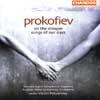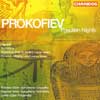Prokofiev On the Dneiper; Songs of Our Days
Valuable insights into Prokofiev the composer in some rarely heard works
View record and artist detailsRecord and Artist Details
Composer or Director: Sergey Prokofiev
Genre:
Vocal
Label: Chandos
Magazine Review Date: 7/2003
Media Format: CD or Download
Media Runtime: 67
Mastering:
Stereo
DDD
Catalogue Number: CHAN10044

Tracks:
| Composition | Artist Credit |
|---|---|
| On the Dnieper |
Sergey Prokofiev, Composer
Russian State Symphony Orchestra Sergey Prokofiev, Composer Valéry Polyansky, Conductor |
| Songs of Our Days |
Sergey Prokofiev, Composer
Igor Tarasov, Baritone Russian State Symphonic Cappella Russian State Symphony Orchestra Sergey Prokofiev, Composer Valéry Polyansky, Conductor Victoria Smolnikova, Mezzo soprano |
Composer or Director: Sergey Prokofiev
Genre:
Vocal
Label: Chandos
Magazine Review Date: 7/2003
Media Format: CD or Download
Media Runtime: 73
Mastering:
Stereo
DDD
Catalogue Number: CHAN10056

Tracks:
| Composition | Artist Credit |
|---|---|
| Hail to Stalin |
Sergey Prokofiev, Composer
Russian State Symphonic Cappella Russian State Symphony Orchestra Sergey Prokofiev, Composer Valéry Polyansky, Conductor |
| Autumnal sketch |
Sergey Prokofiev, Composer
Russian State Symphony Orchestra Sergey Prokofiev, Composer Valéry Polyansky, Conductor |
| Hamlet |
Sergey Prokofiev, Composer
Andrei Baturkin, Baritone Russian State Symphony Orchestra Sergey Prokofiev, Composer Tatyana Sharova, Soprano Valéry Polyansky, Conductor |
| Cantata for the 30th Anniversary of the October Revolution |
Sergey Prokofiev, Composer
Russian State Symphonic Cappella Russian State Symphony Orchestra Sergey Prokofiev, Composer Valéry Polyansky, Conductor |
| Egyptian Nights |
Sergey Prokofiev, Composer
Russian State Symphony Orchestra Sergey Prokofiev, Composer Valéry Polyansky, Conductor |
Author: David Fanning
Likewise the Songs of our Days, composed two years earlier – just after the spectacular (and then unperformed) Cantata for the 20th Anniversary of the Revolution – with their texts fawning before the ‘man behind the Kremlin walls… [whom] the entire land knows and loves’. Likewise, too, the cantata Flourish, Mighty Land, composed for the 30th anniversary of the revolution (‘Stalin leads the way forward. The people follow the leader’).
A few years earlier Prokofiev was in demand for several projects for the theatre, all of which sooner or later fell foul of the guardians of early socialist realism. The first of these projects – Egyptian Nights, to a 1934 conflation of Pushkin, Shaw and Shakespeare – yielded the most memorable music and enjoyed the most initial success. From four years later, Hamlet – produced by the same Sergey Radlov responsible for Love for Three Oranges in 1926 and Prokofiev’s ballet Romeo and Juliet – is more circumspect (and not a patch on Shostakovich’s music for the very different Soviet Hamlet back in 1932).
The moody Autumnal, early harbinger of Prokofiev’s eventual turn to a new lyricism, shows the 19-year-old not quite himself, but experimenting in the gloomy vein of his great friend Myaskovsky. Even better as a filler for this disc, perhaps, would have been the early apocalyptic cantata Seven, They are Seven, otherwise currently unavailable.
But it is wonderful to have the 40-minute ballet On the Dnieper restored to the catalogue. Not commissioned by Diaghilev, as the booklet has it, but by Serge Lifar in his capacity as director of the Paris Opera’s corps de ballet, this is a modest but treasurable score. Its predominantly lyrical tone helps pave the way from The Prodigal Son to Romeo and Juliet, and its rather Copland-ish theme of ‘timid and hopeless love’ (first heard in track 3 at 0'35") is just the most striking of many ideas that gradually worm their way into one’s affections on repeated listening.
As in their other recordings, the voices of the Russian State Symphonic Cappella produce a very covered sound that tends to be fractionally under the note, especially in the sopranos. But at least they avoid the squally quality of so many choirs trained in the Soviet era. From the point of view of authenticity, their half-heartedness in the apotheoses to Stalin is perhaps to be regretted; but it is hard not to sympathise. The solo voices in Songs of our Days are rather flaky; those in the Hamlet Suite are much firmer.
Valéry Polyansky’s personality – inclined more to luxuriate than to drive forward or to put sharp points on the articulation – is everywhere in evidence; not everyone will like the very soft-grained orchestral playing, but in such rarely heard repertoire it’s hard to be choosy. The ambience on the recordings is very generous, at times bordering on artificiality.
Discover the world's largest classical music catalogue with Presto Music.

Gramophone Digital Club
- Digital Edition
- Digital Archive
- Reviews Database
- Full website access
From £8.75 / month
Subscribe
Gramophone Full Club
- Print Edition
- Digital Edition
- Digital Archive
- Reviews Database
- Full website access
From £11.00 / month
Subscribe
If you are a library, university or other organisation that would be interested in an institutional subscription to Gramophone please click here for further information.




